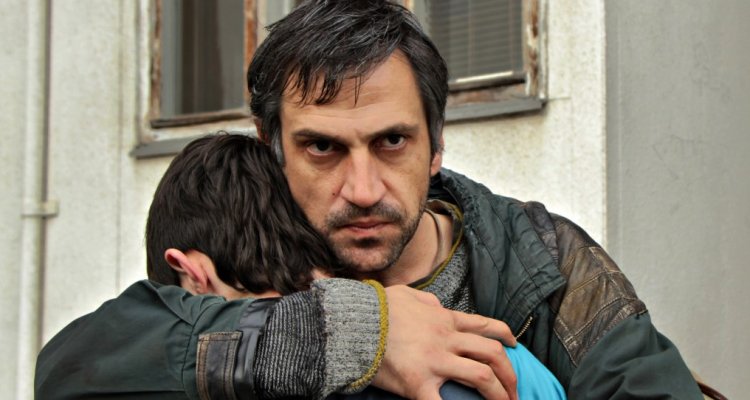When Nikola (Goran Bogdan) is asked, “Have you noticed anything that could indicate your wife’s suicidal intentions?” all he can resignedly answer is, “We live a hard life.” It’s been two years since Nikola was laid off from his job, having never received the remaining salary and severance he had been promised and struggling to find another full-time job. In a desperate plea in front of his former employers for the money owed, his wife Biljana (Nada Šargin) set herself on fire, with her children who were standing by watching, now whisked into foster care. This stark opening sets the stage for Srdan Golubović’s steely, resonant, and Dardennes-esque “Father,” a seemingly straightforward drama that details a complex portrait of a nation, through the journey of a single, determined man.
READ MORE: 12 Most Anticipated Films Of The 2020 Berlin International Film Festival
Nikola doesn’t say much, and his inscrutable face reveals even less, but while he may be phlegmatic, his intentions are clear. After being advised by Vasiljević (Boris Isaković), the bureaucratically odious and crooked head of the Centre for Social Work, that getting his house in order before an inspection will help get his kids back, Nikola doesn’t waste a moment. The father connects the home to his neighbor’s electrical line, rigs up running water in the bathroom, and paints and plasters as much as he can. However, after doing nearly everything that’s asked of him, it’s not enough — Vasiljević orders that Nikola’s children remain in foster care. After discovering that Vasiljević may be sending children to his friends and relatives, and skimming some of the government money for their care off the top, Nikola decides to take his battle to this minister of social services in Belgrade. The father enlists a friend with a computer to draft a letter of appeal, packs his bag with some fruit and stale bread, and sets off on foot to the capital. However, Nikola isn’t interested in uncovering Vasiljević’s graft — he just wants his kids back.
Driven by Bogdan’s commanding and reserved performance, Golubović uses the odyssey in the script he co-wrote with Ognjen Sviličić to explore the reality of the challenges facing those living in rural Serbia as it contrasts against the glittering facade of Belgrade. As Bogdan traverses the villages and fields in his 300-kilometer hike, the rutted roads, abandoned buildings, and decaying infrastructure speak volumes about the day-to-day existence of those living far downstream from the economic flow in the capital. While Belgrade stands among Europe’s modern and evolving metropolises, Nikola’s confrontation with the casual corruption of local politicians like Vasiljević, and the spartan, hardscrabble life he and his neighbors must live, indicates that the rest of country has a long way to go to catch up.
READ MORE: The 25 Best Movies Of 2020 We’ve Already Seen
Lensed with patient wide shots, and nearly invisible push-ins by the director of photography, Aleksandar Ilič, the film quietly observes the world around Nikola as he moves through it with single-minded focus. Bogdan’s work may not be flashy, but the film lives on his wearied face, slumped shoulders, and Nikola’s ragged, indefatigable persistence. Around this, Golubović unfurls a bitter and conflicted observation of his native country. Nikola encounters kindnesses and consideration in his odyssey, often from those who have as little or even less than himself. However, the father is also victim to actions driven by dire self-interest, the perpetrators just trying to make life a little bit more bearable, even as it comes at the expense of someone else’s suffering. There is no doubt that Golubović has affection for Serbia, but he also demands its betterment, something he hopes can be found through people like Nikola, who tenaciously rages against a system that never considered him to begin with.
A drama that surprisingly crests with raw, moving moments of tenderness, Golubović is not so optimistic as to bring Nikola’s story to a complete resolution. Instead, uncertainty hovers over the future, but with a feeling that he can face it with defeated acceptance. Nikola has rarely known the comfort that comes with the confidence that the next day will bring food on the table, the reliability of employment, or a helping hand when faced with another unexpected difficulty. “Father” leaves us, like Nikola, off-balance but with the assurance that his spirit may be beleaguered, but remains unbroken. [A-]
Click here for our full coverage of the 2020 Berlin International Film Festival.

